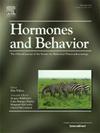雌性雄激素对合作繁殖哺乳动物发声个体发育和发育可塑性的代际影响
IF 2.4
3区 医学
Q2 BEHAVIORAL SCIENCES
引用次数: 0
摘要
发育可塑性,即使一个人的表型适应环境的能力,在生命早期阶段至关重要,并可能影响健康。尽管雄性激素在某些物种的雌性之间存在显著差异,但母体激素对野生哺乳动物后代个体发育的影响很少被研究。在这里,我们依靠自然和实验诱导的雄激素作用在显性和从属雌性狐獴(Suricata suricatta)之间的变化,来研究它们后代的声音发育的可塑性。猫鼬是一种合作繁殖的猫鼬,拥有丰富的声乐曲目。在不同的发育阶段,我们记录了雄激素绝对浓度自然不同的优势对照母和在妊娠后期接受雄激素受体阻滞剂治疗的优势对照母的后代发出的叫声。使用叫声类型作为指标,我们发现优势对照母亲的后代即使在不利的环境条件下也具有稳健的声音轨迹;在完全依赖营养之后,它们的声音发育相对于其他后代加快了。相反,从属对照和显性抗雄激素治疗的母亲的后代都出现了个体发育迟缓;他们在轨迹上表现出明显的性别差异,对社会生态影响更敏感。抗雄激素暴露的后代也表现出非典型的早期呼叫使用。这些发现提供了罕见的证据,表明雌性雄激素可能根据社会生态环境的要求调节哺乳动物后代的发育。本文章由计算机程序翻译,如有差异,请以英文原文为准。
Intergenerational effects of maternal androgens on vocal ontogeny and developmental plasticity in a cooperatively breeding mammal
Developmental plasticity, the ability to adapt one's phenotype to environmental cues, is crucial during early-life stages and can affect fitness. Despite significant androgenic variation between females of select species, the impact of maternal hormones on offspring ontogeny in wild mammals has been rarely investigated. Here, we rely on natural and experimentally induced variation in androgen action between dominant and subordinate female meerkats, Suricata suricatta, to examine plasticity of vocal development in their offspring. Meerkats are cooperatively breeding mongooses that have a rich vocal repertoire. We recorded calls produced at distinct developmental stages by offspring from dominant and subordinate control mothers that naturally differ in absolute androgen concentrations and from dominant treated mothers that had received an androgen-receptor blocker in late gestation. Using call types as indicators, we found that the offspring of dominant control mothers had a robust vocal trajectory, even under adverse environmental conditions; following full nutritional dependence, their vocal development was accelerated relative to that of other offspring. Conversely, offspring from both subordinate control and dominant antiandrogen treated mothers suffered ontogenetic delays; they showed distinct sex differences in trajectory and a greater sensitivity to socio-ecological influences. Antiandrogen-exposed offspring also showed atypical early call usage. These findings provide rare evidence of the potential for maternal androgens to mediate mammalian offspring development in accordance with demands of the socio-ecological environment.
求助全文
通过发布文献求助,成功后即可免费获取论文全文。
去求助
来源期刊

Hormones and Behavior
医学-行为科学
CiteScore
6.70
自引率
8.60%
发文量
139
审稿时长
91 days
期刊介绍:
Hormones and Behavior publishes original research articles, reviews and special issues concerning hormone-brain-behavior relationships, broadly defined. The journal''s scope ranges from laboratory and field studies concerning neuroendocrine as well as endocrine mechanisms controlling the development or adult expression of behavior to studies concerning the environmental control and evolutionary significance of hormone-behavior relationships. The journal welcomes studies conducted on species ranging from invertebrates to mammals, including humans.
 求助内容:
求助内容: 应助结果提醒方式:
应助结果提醒方式:


